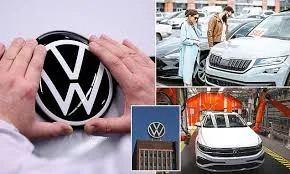
Volkswagen Group Halts US Car Imports Amid Tariff Crisis
In response to the U.S. administration’s implementation of a 25% tariff on auto imports from Mexico and Canada, Volkswagen Group has suspended all vehicle shipments to the United States. This measure particularly affects Audi, Volkswagen’s luxury division, which relies heavily on imports from its manufacturing facilities in Germany, Hungary, Slovakia, and Mexico. Audi has instructed its U.S. dealers to depend on the existing inventory of approximately 37,000 vehicles, anticipating potential supply shortages due to the tariffs.
The tariffs pose a significant challenge for Volkswagen, given that a substantial portion of its U.S. sales are derived from models produced in Mexico, including the Jetta, Tiguan, and Taos. Analysts estimate that up to 65% of Volkswagen’s U.S. sales could be adversely affected if these duties are enforced, potentially making the affected models less competitive in the American market.
In an effort to mitigate the impact, Volkswagen is considering expanding its production capacity within the United States. Options under evaluation include increasing production at its existing plant in Chattanooga, Tennessee, and establishing new facilities for its luxury brands, Audi and Porsche. This strategy aims to reduce reliance on imports and shield the company from the adverse effects of the tariffs.
Volkswagen’s Chief Financial Officer, Arno Antlitz, emphasized the company’s significant investments in the U.S., highlighting the creation of over 20,000 jobs. He expressed hope that these contributions would be considered in any trade policy decisions, underscoring the potential negative consequences of the tariffs on both the automotive industry and American consumers.
The European Union has voiced concerns over the tariffs, suggesting possible retaliatory measures. European automakers, represented by the European Automobile Manufacturers’ Association (ACEA), have criticized the tariffs for potentially increasing costs and reducing demand, further complicating the global automotive market landscape.